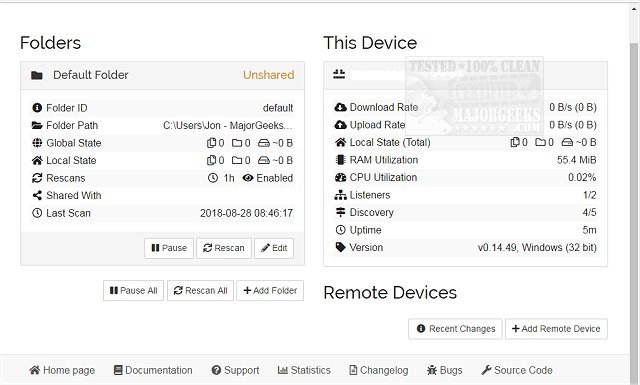Syncthing has released version 2.0.4, enhancing its capabilities as a reliable open-source alternative to proprietary file synchronization and cloud services. This software is designed to ensure safety, security, and decentralization, allowing users to maintain complete control over their data. Syncthing operates by continuously syncing files across multiple computers with minimal user intervention, making it a seamless solution for file management.
The application features a user-friendly browser-based graphical user interface (GUI) that simplifies the configuration and monitoring of file-sharing activities. One of the standout aspects of Syncthing is its commitment to privacy; it does not store users' data on third-party servers, ensuring that all files remain local to the devices in use. Communication between devices is secured through Transport Layer Security (TLS), and each device is authenticated with a robust cryptographic certificate. This means that only devices explicitly permitted by the user can connect to the network, enhancing the security of the file-sharing process.
In addition to its core functionalities, users can benefit from features such as versioning and file conflict resolution, making Syncthing not only a tool for synchronization but also a comprehensive solution for data management. As Syncthing continues to evolve, it remains a strong choice for those seeking a decentralized and open-source alternative to traditional file-sharing services.
For users looking to explore the capabilities of Syncthing further, additional resources and guides are available, including topics like backing up Google Drive or resetting Windows operating systems. As Syncthing grows, its community-driven development ensures that it remains responsive to user needs and technological advancements
The application features a user-friendly browser-based graphical user interface (GUI) that simplifies the configuration and monitoring of file-sharing activities. One of the standout aspects of Syncthing is its commitment to privacy; it does not store users' data on third-party servers, ensuring that all files remain local to the devices in use. Communication between devices is secured through Transport Layer Security (TLS), and each device is authenticated with a robust cryptographic certificate. This means that only devices explicitly permitted by the user can connect to the network, enhancing the security of the file-sharing process.
In addition to its core functionalities, users can benefit from features such as versioning and file conflict resolution, making Syncthing not only a tool for synchronization but also a comprehensive solution for data management. As Syncthing continues to evolve, it remains a strong choice for those seeking a decentralized and open-source alternative to traditional file-sharing services.
For users looking to explore the capabilities of Syncthing further, additional resources and guides are available, including topics like backing up Google Drive or resetting Windows operating systems. As Syncthing grows, its community-driven development ensures that it remains responsive to user needs and technological advancements
Syncthing 2.0.4 released
Syncthing is a portable Open Source replacement from proprietary sync and cloud services designed to be safe, secure, and decentralized.


